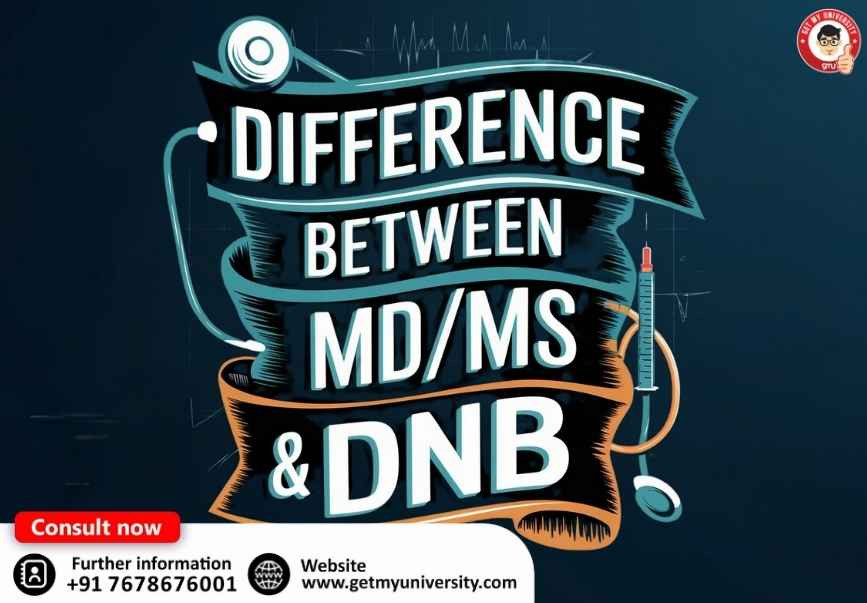Introduction
For medical graduates who wish to specialize after completing their MBBS, choosing between DNB (Diplomate of National Board) and MD/MS (Doctor of Medicine/Master of Surgery) is a significant decision. Before diving into this choice, it’s crucial to understand what DNB actually is, how it differs from MD/MS, and whether it holds the same value. Many students wonder if DNB is seen as less prestigious than MD/MS, but in reality, DNB is a solid option and is now recognized as equivalent to MD/MS in most respects.
In this blog, we’ll break everything down in simple terms to give you a clear understanding of DNB. By the end, you’ll be able to confidently decide if DNB is the right path for you and see how it stands on equal footing with MD/MS.
Call us on +917678676001
Or
Write us at info@getmyuniversity.com
What is DNB?
DNB, which stands for Diplomate of National Board, is a postgraduate medical qualification awarded by the National Board of Examinations (NBE) in India. Despite what the name might suggest, DNB is not a diploma program, but a degree program that is equivalent to the MD (Doctor of Medicine) and MS (Master of Surgery) degrees conferred by medical universities.
DNB offers training in various medical and surgical specialties, providing doctors with an opportunity to further specialize and enhance their expertise in their chosen field. This degree is recognized across India and abroad, and over the years, it has become a respected alternative to the traditional MD/MS pathway.
What is MD/MS?
MD (Doctor of Medicine) and MS (Master of Surgery) are highly sought-after postgraduate medical degrees awarded by recognized medical universities in India. These programs allow medical graduates to specialize in a particular area of medicine or surgery.
Students pursuing MD or MS benefit from a balanced combination of theoretical learning in their respective medical colleges and comprehensive clinical exposure in hospitals. This hands-on experience allows them to gain real-world skills, preparing them to work as specialists in their chosen fields and pursue further super-specialization if desired.
Both degrees are recognized by the National Medical Commission (NMC) and are essential for building a successful career in the medical field.
How is DNB different from MD/MS?
DNB and MD/MS both the PG Programmes are equal. However, there arises minor differences between the two. Here are the few differences: -
- Training:- The main difference between DNB and MD/MS lies in the type of training provided. For MD/MS programs, the training takes place in a medical college that is linked to a teaching hospital, ensuring a structured academic environment along with clinical exposure. In contrast, for DNB programs, the training happens directly in a hospital from the very first day.
- Exam:- One significant difference lies in how the exams are conducted. MD/MS examinations are organized by universities and include internal assessments along with final exams. In contrast, DNB exams, administered by the National Board of Examinations (NBE), are generally more rigorous. These exams take place at various locations across India, outside campus, and include both theoretical and practical components that are considered quite challenging.
- Fee Structure: - Pursuing an MD or MS degree is often viewed as a costly due to high tuition fees. In contrast, the DNB fee structure is generally more affordable, making it a financially appealing option for many medical graduates. Despite both MD/MS and DNB holding equal value in terms of qualifications, the lower costs associated with DNB can significantly ease the financial burden on students.
Is DNB less valuable?
The DNB (Diplomate of National Board) is a highly respected qualification with great value. From the very beginning, students get a lot of clinical experience because their training happens directly in hospitals. This hands-on learning helps them build the practical skills they need for a successful medical career, making DNB graduates well-prepared and capable in real-life medical practice.
Some people mistakenly think that DNB is less valuable, but that’s not true. DNB actually offers more clinical exposure at a lower cost and holds the same worth as other medical degrees. The only reason it may seem less known is because there is less awareness about DNB among the public.
Difference between MD/MS and DNB
The key differences between MD/MS and DNB are as follows:
The following factors differentiate the MD/MS and DNB programs: availability of seats, fee structure, duration of the courses, recognition and acceptance, career opportunities, and scope of practice.
| Factor | MD/MS | DNB |
| Seats | Few seats are available in MD/MS programs due to limited capacity in affiliated medical colleges. | A significant number of seats are offered in various accredited hospitals, creating greater opportunities for candidates. |
| Fees | Expensive, with high tuition fees and additional costs associated with studying in established medical colleges. | Affordable fee structure compared to MD/MS, making it a financially appealing option for many aspiring specialists. |
| Tenure | Usually takes 3 years to complete for both MD and MS programs. Some super-specializations may require additional years. | Generally, DNB takes 3 years as well; however, the duration may vary slightly based on the specialty and institution. |
| Acceptance | Recognized by the National Medical Commission (NMC) and many institutions worldwide. | Also recognized by the NMC and considered equivalent to MD/MS, gaining respect and acceptance in clinical practice and academia. |
| Scope | Offers diverse specializations and the possibility of pursuing super-specializations after completion. The scope is broad both in clinical and academics. | Provides extensive clinical exposure and opportunities for super-specialization. DNB graduates are well-prepared for real-world practice and have an equivalent scope as MD/ MS graduates in many areas. |
Conclusion
To sum it up, DNB is a credible and valuable postgraduate qualification, just like MD/MS. It offers great clinical exposure, equivalent recognition in most areas, and wide availability of seats. While DNB exams might be more challenging, the effort is worth it, and the degree opens doors to numerous career opportunities. So, if you’re a medical graduate considering specialization, DNB is certainly a good option and stands on equal footing with MD/MS.
Whether you choose DNB or MD/MS, your success will depend on the quality of training, your dedication, and how well you leverage the opportunities available during your postgraduate journey. Need guidance in choosing between DNB and MD/MS?
Contact Team Get My University for expert advice on your medical career!















